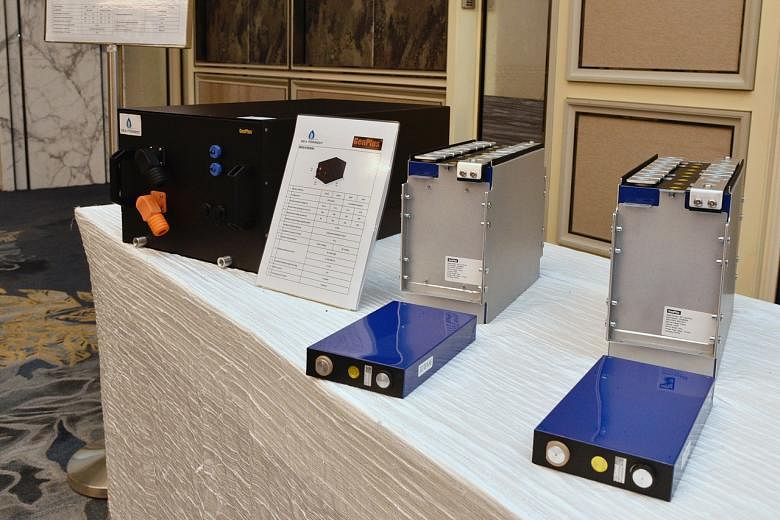Battery modules will be remodelled from used batteries of electric cars into modular packs for ships to prevent wastage. ST PHOTO: DESMOND WEE


Correspondent
PUBLISHED
14 MAR 2022, 6:28 PM SGT
SINGAPORE - Offshore wireless charging points for ships and electric boats from which drones can take off are among some ideas explored by an alliance of seven entities that will invest over $20 million to revamp Singapore's coastal delivery system.
The Coastal Sustainability Alliance was launched at the Shangri-La Singapore hotel on Monday (March 14) but has been in talks for over a year.
They want to lead the transition of the country's current 1,600 low-tech harbour craft, used to deliver supplies from shore to ships parked in Singapore's waters, to run on more environmentally-friendly fuel and be more efficient as they are gradually phased out.
They will also build a network of stationary and mobile electric chargers for these ships along the country's coast and remodel used batteries from electric cars into modular packs for ships to prevent wastage.
The alliance is made up of Kuok (Singapore) Maritime Group, Agency for Science, Technology and Research (A*Star), GenPlus, Jurong Port Singapore, TCOMS, Sea Forrest and TES.
Trials of electric vessels may begin as early as 2024, according to the alliance.
Mr Tan Thai Yong, chairman of the alliance's council and chief executive of maritime engineering company PaxOcean, said the changed ecosystem will lead to a 50 per cent reduction in harbour craft's carbon emissions by 2030.
"We have a clear goal: to build Singapore's next-generation maritime ecosystem by 2030. We endeavour to build a full suite of wireless electric charging infrastructure networks with shore and floating charging points along our coastline," he added.
The alliance is envisioning the new vessels that will be rolled out then to be compatible with the growing use of drones to deliver goods, suggesting that some craft can also be platforms for shorter-range drones to take off and land.
Some of these vessels could be autonomous and make multiple deliveries, instead of the current one-trip- one-delivery system that takes hours.
The consequent reduction of launch boat movement - by about 20 per cent - by 2030 will also lead to less fuel use, part of the push towards more sustainable shipping.
Mr Kenneth Lim, assistant chief executive of the Maritime and Port Authority of Singapore's (MPA) industry department, said the alliance will plug neatly into MPA's ongoing initiatives.
MPA last week announced a $300 million, 2050 maritime decarbonisation blueprint. One of its aims is the electrification of Singapore's harbour craft, with the whole fleet to run on electricity and/or net zero fuels by 2050.
He added: "Given the higher cost of adoption, a viable transition would need to be supported by a diverse suite of green financing options. MPA is working with MAS (Monetary Authority of Singapore) and industry partners to develop Singapore as a green maritime financing hub."